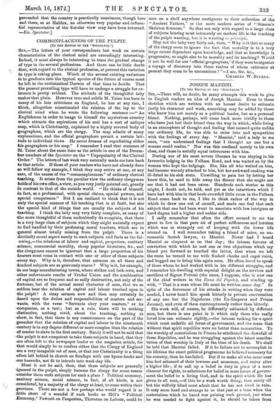COMMONPLACENESS OF THE PULPIT.
[TO THE EDITOR OF THE "SPECTATOR."] STR,—The letters of your correspondents last week on certain characteristics of the clerical mind are exceedingly interesting. Indeed, it must always be interesting to trace the gradual change of type in the several professions. And there can be little doubt that, with regard to the clerical profession, at present this variation in type is taking place. Which of the several existing variations is to graduate into the typical species of the future of course must be left to the ecclesiastical Darwin of that time to decide. That the present prevailing type will have to undergo a struggle for ex- istence is pretty evident. The attitude of the thoughtful laity snakes that plain. However true and subtle M. Taine has been in many of his late criticisms on England, he has at any rate, I think, altogether misestimated the relation of the lay to the clerical mind when he wrote the following sentence :—" An Englishman in order to image to himself the mysterious country which attracts the aspirations of his soul has a sort of antique map, which is Christianity, explained by a highly revered body of geographers, which are the clergy. The map admits of many explanations, and the official geographers permit a certain lati- tude to individual views. He never dreams of repudiating either his geographers or his map." I remember I read that sentence of 111. Take about the same time as the article in one of the Decem- ber numbers of the Spectator on the " Unpopularity of the Clerical Order." The letters of last week very naturally made me turn back to that article. If those of your readers who have not already done ao will follow my example, I think they may arrive at one, at any Tate, of the causes of the " commonplaceness " of ordinary clerical teaching. It arises from the peculiar view the ordinary clergyman holds of his own office, a view, as you very justly pointed out, greatly in contrast to that of the outside world. " He thinks of himself, in fact, as a professional, with special claims, special powers, and special competence." But I am inclined to think that it is not only the special manner of his teaching that is at fault, but also the special kind of things that are usually the subjects of his teaching. I think the laity may very fairly complain, as many of the more thoughtful of them undoubtedly do complain, that there is a very large class of subjects which they might naturally expect to find handled by their professing moral teachers, which are in general almost totally missing from the pulpit. There is a decidedly moral aspect surely to such subjects and facts as the fol- owing,—the relations of labour and capital, pauperism, sanitary science, commercial morality, cheap popular literature, &c., and the clergyman cannot be ignorant that a large proportion of his hearers must come in contact with one or other of these subjects
• every day. Why is it, therefore, that sermons on all these and kindred subjects are so grievously scarce ? Why is it, for example, sin our large manufacturing towns, where strikes and lock-outs, and -other unfortunate results of Trades' Union and the combination of capital are so frequent and so sadly destructive, not only of the -fortunes, but of the actual moral character of men, that we so :seldom hear the relation of capital and labour touched upon in 'the pulpit? A stray sermon now and then may certainly be -heard upon the duties and responsibilities of masters and ser- • vante, with the verse " Servants obey your masters," or its • companion, as a text; but as a rule, there will be nothing • distinctive, nothing vivid, about the teaching, nothing to :show, in fact, that there is any consciousness on the part of the /preacher that the relation of capital and labour in the nineteenth -century is in any degree different or more complex than the relation of master to slave in the first century. Surely it will not be said that 'the pulpit is not competent to take these subjects in hand, that they are often left to the newspaper leader or the magazine article, for that would simply be to confess either that the Clergy of England are a very incapable set of men, or that our Christianity is a thing -often left behind in church on Sundays with our hymn-books and .our hassocks, not fit to intrude into week-day life.
Must it not be said, then, that these subjects are generally 'ignored in the pulpit, simply because the clergy for some reason -consider them unfit subjects for such a place ? Political economy, :sanitary science, social science, in fact, of all kinds, is not -considered, bya majority of the clergy at least, to come within their ,province. There are not a few perhaps who would regard it as little short of a scandal if such books as Mill's " Political _Economy," Fawcett on Pauperism, Thornton on Labour, could be seen on a shelf anywhere contiguous to their collection of the "Ancient Fathers," or the more modern series of " Simeon's Skeleton Sermons." So that not only with regard to a large class of subjects bearing most intimately on modern life is the teaching of the pulpit wanting, but it is wanting on principle.
May not the laity very fairly ask, then, " Wby is it that so many of the clergy seem to ignore the fact that morality is to a very large extent dependent upon knowledge, and that as knowledge is progressive, so ought also to be morality and its teaching? Would it not be well for our c official geographers,' if they were to organize a voyage of discovery into those realms of whose existence at present they seem to be unconscious ? "—I am, Sir, &c., CHARLES W. STUBBS.


































 Previous page
Previous page